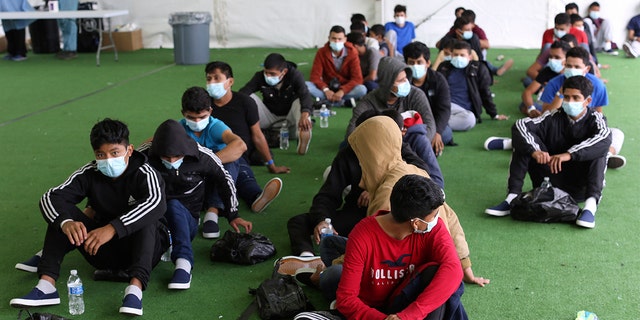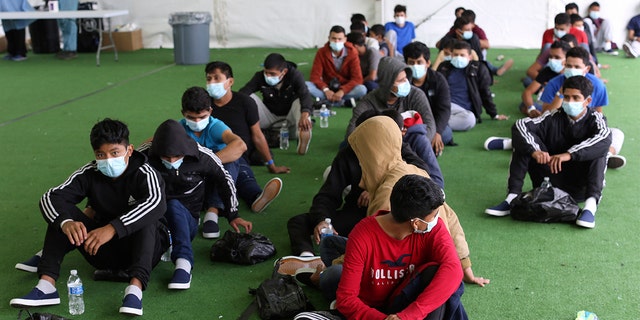
Unaccompanied migrant children housed at an emergency shelter inside Fort Bliss were said to have suffered from panic attacks, anxiety and a “pervasive sense of despair” as they were held for prolonged stays without regular updates, according to a watchdog report issued this week.
The Health and Human Services (HHS) Office of Inspector General issued the report on the Emergency Intake Site (EIS) in the Texas Army base, that was set up in March 2021 at the start of a historic migrant surge — and where child migrants were held before they could be transported to regular care centers and sponsors.
Unaccompanied children are typically placed into HHS care before they can be united with a sponsor — typically a parent or relative already living in the U.S. But a combination of a spike in numbers and COVID-19 restrictions led to a crisis for the agency.
Numbers of unaccompanied children surged from fewer than 20,000 referrals in FY 2020 to over 120,000 in FY 21. The numbers in HHS care went from fewer than 5,000 in January 2021 to over 20,000 by April. The IG also found that HHS’ Office of Refugee Resettlement (ORR) had its capacity to care for minors diminished due to COVID-19 related staff shortages and decreases in bed space.
Facing the enormous spike in illegal immigrant unaccompanied children, HHS resorted to opening 14 of the Emergency Intake Sites, which included military bases like Fort Bliss. EISs were intended to be short-term facilities to be open for less than six months and to act as a stopgap before licensed care facilities became available.
The creation of the EIS system immediately drew concern from immigrant advocates and lawmakers about the quality of care being delivered. The report found that those concerns were, in many cases, justified. The IG found that case management positions were often filled with inexperienced case managers who lacked best-practice knowledge, and that staff were not given adequate training.
The report said that staff reported that children experienced “distress related to infrequent communication from case managers” with reportedly hundreds of minors going weeks and sometimes months without receiving updates.
Guidance on how often case managers should meet with the UACs was not published until late May and case managers also reported having enormous caseloads of 30-35 children each, as well as deficiencies with the online case management system.

FILE – In this March 30, 2021 file photo, young migrants wait to be tested for COVID-19 at the Donna Department of Homeland Security holding facility, the main detention center for unaccompanied children in the Rio Grande Valley, in Donna, Texas. (AP Photo/Dario Lopez-Mills, Pool, File)
“Kids would say, ‘I haven’t talked to my case manager in 48 days.’” one youth worker was quoted as saying. “They had a sense that they had been forgotten.”
“Even if someone was working the case, it wasn’t communicated to the kids in any systematic way,” they said. “One girl kept saying she didn’t know what was going on and one day she broke down and said she couldn’t take it anymore.”
BILL CLINTON SAYS ‘THERE IS A LIMIT’ TO HOW MANY MIGRANTS US CAN TAKE WITHOUT CAUSING ‘DISRUPTION’
One interviewee described panic attacks, anxiety and “a pervasive sense of despair” among children at the facility — including one young girl who would hit and cut herself after learning that her mother has not been contacted, and was eventually moved to a psychiatric facility.
The report also faulted ORR for issuing early field guidance which removed steps of the sponsor screening process – including some background checks and identity verification — which increased the risk of children being released to unsafe sponsors, with staff raising concerns about such a possible outcome
“Case management staff are encouraged to strive to do the absolute minimum vetting of sponsors to effectuate the quickest releases. As a result, there are safety issues that are likely being overlooked,” a letter from supervisors to ORR leadership said.
The IG also reported concerns from staff about potential retaliation against whistleblowers who raised issues about safety and case management, which it said created an atmosphere where staff were “discouraged” from raising concerns.
One employee reported having sent an email about concerns of the lack of case management — only to be dismissed from the assignment by the HHS contractor.
Since then, 12 of the 14 sites have been closed and the remaining two — including the site at Fort Bliss — has been converted to an influx care facility. HHS said that migrants now spend less than two weeks in the facility.
The report’s recommendation includes calls for better training for case managers, whistleblower protections and upgrades to the case management system. HHS concurred with its recommendations and in a response said it had dealt with “one of the most challenging periods in ORR’s history amid a historic number of unaccompanied children placed in ORR care, the largest and fastest expansion of emergency capacity, and at the height of the [COVID-19] pandemic.”
CLICK HERE TO GET THE FOX NEWS APP
Its formal response issued a list of improvements its EIS had made, including improvements in case management, reductions in lengths of stay, improvements to whistleblower protections and a Quality Control/Quality Review Strike Team.
“Since OIG’s review period concluded, the ORR EIS at Fort Bliss has enhanced services for unaccompanied children, including expanding educational and recreational activities, offering weekly individual and group counseling sessions in addition to emergency mental health services, and implementing critical aspects of the full initial medical exam as required by the [Flores Settlement Agreement],” the response said.








